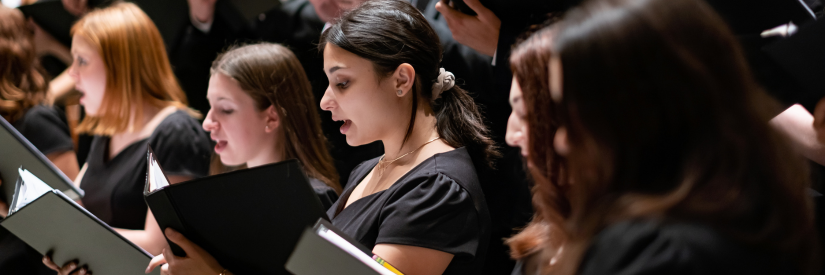Music

Why should I study music?
Music is ubiquitous. It’s at home, in the car, at the gym, and in the mall. It’s there when you watch an ad, a TV show, a movie, or a TikTok video. Studying music at university means not only learning to perform and compose music, but to use it strategically as a communication tool. Moreover, studies are emerging that show that playing music—alone and with others—can improve cognitive functions and personal wellbeing.
What skills do music students develop?
Students learn to sing or play an instrument (solo and in ensembles), develop basic keyboard and aural skills, study the history and theory of music, and learn how to write and record music.
What degrees does the Music Program offer?
The Music Program offers a range of degree options, which allows students to create a path of study that best aligns with their interests and aspirations. Students can obtain a Bachelor of Arts while majoring in performing arts with a concentration in music or a comprehensive concentration, which combines coursework in music and theatre. Students can also pursue an interdisciplinary major combining music with another area of study. A minor in music is also available.
What types of courses does the Music Program offer?
Music students specialize in singing or playing an instrument through private lessons and must participate in one or more of our ensembles (Concert Choir, Cantorei, Chamber Ensemble, Guitar Ensemble, Jazz Ensemble, Jazz Combo, or Steel Pan Ensemble). The Music Program offers courses in music theory, songwriting, history, and criticism, as well as music recording, mixing, and mastering in our state-of-the-art studio.
What is different about the Music Program at Loyola compared to other universities?
Because we are not a conservatory, performance is not the sole—or even the dominant—pillar of the program. We do not require an audition to major in music, and student performers at any level will progress at their own pace with our applied music lesson instructors. Recognizing that professions in music are wide-ranging, we offer a program that is flexible, multi-faceted, and combinable with other major and minor programs at Loyola.
We offer a basic music core curriculum that covers rudimentary theory, aural, and keyboard skills, as well as music history. Beyond that, the possibilities are endless. Students interested in communication and media studies will be especially interested in our courses in film music and sound recording. Composers can study songwriting, arranging, and advanced theory. Business-minded students can take on a business minor and become an arts or non-profit administrator. Aspiring teachers can study conducting and become certified through Loyola’s School of Education. The Music Program’s small class sizes ensure that students receive individual attention and have plenty of opportunities to conduct special for-credit projects that interest them.
What facilities does the Music Program have?
The Music Program has an abundance of music practice rooms, an intimate recital hall, a state-of-the-art recording studio, a brand-new keyboard lab, and a 300-seat proscenium theatre and a 100-seat black box theatre that we share with the Theatre Program.
What are the benefits of being in the Baltimore/DMV area?
Baltimore boasts the world-renowned Baltimore Symphony Orchestra and is home to many outstanding ensembles and companies, such as Opera Baltimore and the Baltimore Consort. The Peabody Institute of the Johns Hopkins University attracts countless guest performers who play in the city, and many of Peabody’s current instructors and alumni also teach at Loyola.
Are there any study abroad opportunities for students in the Music Program?
Loyola maintains a robust study abroad program, with over 60% of undergraduates participating in the program by graduation. While there is not a specific study abroad location for the Music Program, all study abroad locations provide an opportunity for students to learn about another culture, immerse themselves in a foreign language, and assimilate into a new environment.
Are there any internship opportunities for music students?
Students in the Music Program can intern with musical organizations and music education initiatives in Baltimore.
What career options are available with a degree in music?
Our recent graduates have gone into performance and audio engineering, as well as the audiology, business, non-profit, teaching, and publishing fields.
What graduate school options are available with a degree in music?
Students with a Bachelor of Arts in music may choose to attend graduate programs for Master of Music (M.M.) and Doctor of Musical Arts (DMA) in performance and composition; Master of Arts and Ph.D. in theory and musicology; and certificates and master’s degrees in music therapy.